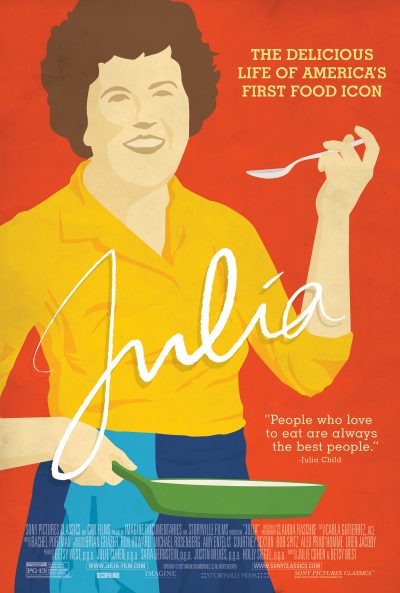
“Julia” (2021). Cast: Interviews: Alex Prud’homme, Jacques Pépin, Charles Gibson, Marcus Samuelsson, José Andrés, André Cointreau, Barbara Fairchild, Ina Garten, Ruth Reichl, Sara Moulton, Dorothy Zinberg, Alex Pirie, Paul Bogaards, Susy Davidson, Jane Friedman. Archive Footage: Julia Child, Paul Child, Simone Beck, Louisette Bertholle, Judith Jones, John McWilliams, Jr., James Beard. Directors: Julie Cohen and Betsy West. Books: Bob Spitz, Dearie: The Remarkable Life of Julia Child, Julia Child and Alex Prud’homme, My Life in France, and Alex Prud’homme, The French Chef in America: Julia Child’s Second Act. Web site. Trailer.
It’s been said that life is too short to spend it doing things we dislike, something that many of us can probably attest to. The thought of living out our days engaged in what gives us pleasure is one that far too many people speculate about but never see through. But it is possible if we put our hearts and minds to it, as evidenced by the life experiences of someone who followed her own path and believed in fulfilling her dreams, a story told in the delightful new documentary, “Julia.”
Who would have thought that a middle-aged woman with a lilting voice, an eccentric demeanor and looks that didn’t exactly match those of an idealized 1960s housewife would become a pop culture icon? But that’s precisely what happened with chef Julia Child (1912-2004), who brought the joy of cooking and eating into the mainstream at a time when most Americans gave it precious little thought. Through the publication of her seminal cookbook Mastering the Art of French Cooking with collaborators Simone Beck and Louisette Bertholle and her myriad television appearances, she brought a new appreciation for the art of the kitchen into the lives of many, serving as meticulous instructor, courageous mentor and eclectic culinary tour guide. In the process, she also single-handedly gave birth to the television cooking show and lent ample credibility to the value of the struggling public television network. And her infamous love of butter at a time when most health care professionals were calling it the Great Satan helped contribute to re-evaluations of this once-taboo food (and sent margarine stocks tumbling). These are noteworthy accomplishments for someone who didn’t discover her true calling in life until well into middle age.
This superb, finely detailed documentary about the French Chef treats viewers to the antics of a truly American original, one whose animated and quirky presentation style was as delicious as what she was preparing in her kitchen. But this signature manner didn’t come early in life for Julia. After graduating college, she explored various options for fulfilling her sense of adventure, a quality that set her apart from many other women brought up in traditional, conservative backgrounds. Following the tried and true was not for her. She wanted something different and that was truly her own.
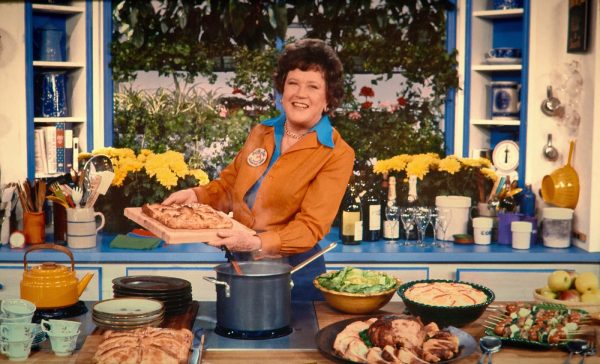
Julia’s first grand adventure came when she joined the OSS, a forerunner to the CIA. She worked as a secretary in Asia during World War II, an experience that led to her meeting the love of her life, Paul Child. Julia fell madly in love with him and followed him everywhere in his various posts, first in Asia as a military man and later in Europe as a State Department official. She thoroughly enjoyed the diversity of her life and travels, as well as the artistic and intellectual stimulation that came from her involvement with Paul. But it wasn’t until he was posted to Paris when her life finally came into focus.
With Julia’s first taste of French food, she instantly fell in love, a romance to rival that of her relationship with her husband. She became so enthralled with French cuisine that she enrolled in the famed Cordon Bleu cooking school, where, as a woman, she stood out in a room full of male students. However, Julia was determined to succeed, and so she hung in there, despite the obvious prejudices directed her way.
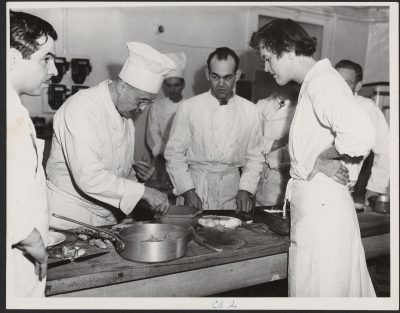
Not long thereafter, Julia met her colleagues Simone and Louisette. Together they launched an impromptu cooking school of their own, Ecole Des Trois Gourmandes, primarily for Parisian housewives who wanted to become more skilled in the kitchen. But this was just a prelude to a bigger project. Simone and Louisette were compiling a French cookbook for an American audience, but, to make it work, they needed the assistance of someone who could translate the text and recipes properly and put the information in a context that homemakers across the pond could understand. The result was a culinary magnum opus that the trio’s original publisher rejected but that was subsequently picked up by another house, where editor Judith Jones helped turn the unconventional manuscript into a blockbuster title whose sales and popularity have persisted to this day.
With the publication of Mastering the Art of French Cooking, Julia made an appearance on a book review show on the public broadcasting affiliate in Boston. It was a program that mostly featured stuffy intellectual conversations and that few people watched. However, when Julia appeared on the show, she included a cooking demonstration with her interview, a move that proved to be pure gold, both for her and the show. The episode was a hit, helping to pave the fortunes of the eccentric chef and the underappreciated TV network. Before long, Julia had her own show, The French Chef, the first of many. She was quickly off and running.
In the ensuing years, Julia became a staple on public broadcasting, eventually reaching a national audience. She would go on to write additional books and eventually join the team of Good Morning America, enabling her to tap into an even larger viewership. In doing so, she celebrated the art of cooking, winning over countless converts to a subject that was once largely ignored by American audiences. And she did it all with flair, panache and her own brand of whimsical humor.
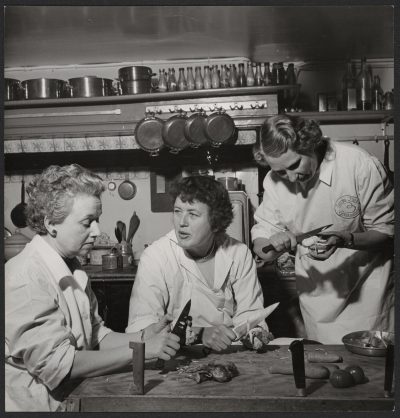
Julia also made a name for herself off-screen. She was a committed activist on several fronts, becoming an ardent voice for the pro choice movement and AIDS victims. She was also a generous supporter of aspiring chefs, helping them to become more widely known and in developing their craft. But such mentorship was typical for Julia, as she incessantly pleaded with her audiences to approach cooking courageously, without fear of the process or even when it came to making mistakes, developments that she believed could always somehow be fixed. Indeed, she made quite an inspiring impression on those who followed her, and what a legacy she left behind.
Wouldn’t it be great if we could all unreservedly follow our passions? Well, actually, that’s entirely possible as long as we believe in the possibility, for that’s the first step in realizing our dreams. This is the cornerstone principle of the conscious creation process, the philosophy that maintains we manifest the reality we experience through the power of these intangible building blocks. And, for her part, Julia was truly a master at this. Even if she was unaware of this school of thought, and even if she often approached her dreams with an outwardly unassuming attitude, she nevertheless employed the principles of this practice with the skill and artistry of a culinary virtuoso.
In making this happen, Julia pushed the envelope of creativity, embracing beliefs that overcame any limitations that might have held her back. Of course, that came somewhat easily for her, given that she freely and totally gave in to her passions, pursuing them and the joy and power of creation with unbridled abandon, qualities that became more than apparent in all of her endeavors.
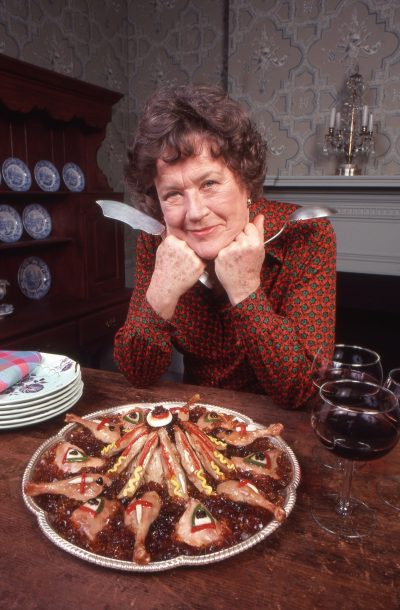
Julia set quite an example in this regard. And it’s one that can be translated into virtually any pursuit, provided we make use of the same principles and embrace the same kinds of fundamental beliefs as she did. We may not all wish to become master chefs, but we can certainly seek to become proficient in other endeavors requiring comparable levels of mastery, be it painting, writing, athletics or virtually any other venture. This truly is a classic case of following one’s heart and relishing the enjoyment that comes from it.
But the example Julia set didn’t end here. She also inspired others by taking on the task of cooking without letting fear get in the way. She found that many aspiring cooks were intimidated by the ways of the kitchen, that they were deathly afraid of making mistakes. Julia never let this stop her, though, and she made that point plainly known through her writings and television appearances. She routinely encouraged her followers to step up to culinary challenges without hesitation, for, if fear were allowed to creep into the mix of manifesting beliefs, disaster could indeed follow. Instead, she urged readers and viewers to approach cooking courageously, without fear. She was not one to wallow in disappointment over kitchen errors. In fact, she saw missteps as learning opportunities so as not to repeat them or even to use one’s creativity to make lemonade from proverbial lemons. Indeed, do-overs were part of kitchen life and shouldn’t be viewed as the end of the world – that is, as long as we put beliefs in place to make such happy endings possible.
Taken together, these qualities combined to forge Julia’s destiny. She may have been a little late coming to it compared to most of us, but eventually she did. And, in doing so, she lived out her value fulfillment, the conscious creation concept associated with being our best, truest selves for the betterment of ourselves and others. Julia took a task that was generally seen as mundane and routine and elevated it to an art form, one worthy of celebration, appreciation and joie de vivre. She revolutionized our notions about cooking and eating and all for the better. She showed us what joy food can bring into our lives and our relationships with others, all served up with hefty helpings of happiness – and, of course, butter.
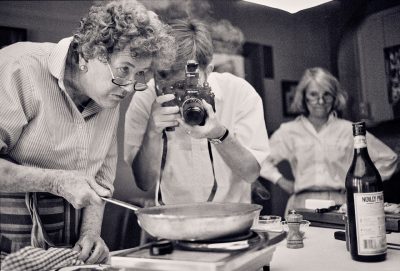
To call Julia one of a kind is indeed an understatement, and this film makes that abundantly clear. As they did in their documentary “RBG” (2018) about Supreme Court Justice Ruth Bader Ginsburg, directors Julie Cohen and Betsy West serve up another fine offering, a sumptuous buffet of all things Julia, including ample archive footage, recent interviews with friends and colleagues, and gorgeously filmed food that will send viewers on a beeline to the nearest gourmet restaurant upon leaving the theater. Fans of Julia and the art of cooking owe it to themselves to see this lovingly assembled tribute to an icon who accomplished and contributed so much and made it look easy – and fun. The film has been playing at film festivals and in limited theatrical release.
Cooking is an activity that can be viewed as a burdensome chore (something to be dutifully but unenthusiastically checked off our list of daily tasks) or as a joy to be richly savored (especially when one gets to eat the finished product!). Julia showed us the difference, as well as how to go about it in what many of us would likely consider the preferred manner. And, what’s more, she did it with fun, eccentricity and many undeniably blissful rolls of the eyes. Given that, then, one can’t help but ask, “Why wouldn’t someone want to live his or her life like that?” Good question, if you ask me. We’d all probably be a lot better off if we followed Ms. Child’s example and spent our days immersed in what gives us pleasure. After all, when the clock runs out, we wouldn’t want to look back on our lives and wish we’d used more butter and less margarine.
Copyright © 2021, by Brent Marchant. All rights reserved.

No comments:
Post a Comment